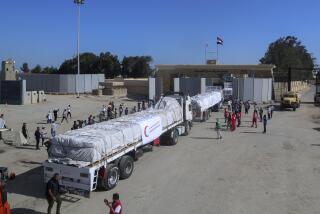Rewards of Somalia Relief Work Deeply Personal
- Share via
MOGADISHU, Somalia — Ben Tricks fell off a racehorse and joined the aid business. Brian Stockwell figured murderous looters offered more challenge than his high school students.
Nearly 200 people from every part of the world are at work in Somalia trying to roll back famine, restore some order and save what’s left of the country. Each has a different set of reasons.
“Someone has to do it,” said Stockwell, a Dubliner with an easy laugh, who shepherds grain through chaotic ports for the U.N. World Food Program.
Stockwell is a lifer. Battered, balding but ebullient at 45, he left teaching in Nigeria in 1980 to work with the Irish voluntary agency Concern, then settled down with WFP.
Tricks, 24, is a newcomer. A bad accident forced him to give up racing in Bristol, England. He was hired to help manage the SOS Children’s Village, an Austrian-run orphanage and hospital.
“It’s something I always wanted to do,” Tricks said, grinning happily as his van bounced past gun barrels in Mogadishu’s streets, protected only by a red SOS symbol.
“Relief workers are only slowed-down travelers,” explained David Shearer of Auckland, New Zealand, who heads operations in Mogadishu for Save the Children.
Anyone who spends time in developing countries feels the need to help in some way, he said.
He heard the call on a truck ride through southern Sudan in 1982.
“We were throwing mango skins off the back and people were fighting for them,” he said. “I realized something must be awfully wrong, and I decided to see what I could do about it.”
Half the foreign relief workers are paid by the United Nations, 35 of those by the U.N. Children’s Fund, as staff officers or consultants. Most of them volunteered for Somalia.
Wages and benefits approach $60,000 a year in some cases, but many U.N. people took a pay cut to come to a place where lawless gunmen have shot aid workers in cold blood.
The International Committee of the Red Cross has nearly 80 foreigners, mostly Swiss. If salaried, none is getting rich for days that start at dawn after sleep punctuated by gunfire.
Private agencies, known as “NGO’s,” for non-governmental agencies, pay on a scale that ranges from nearly nothing to not much.
“I don’t know what we’re making,” said Anne O’Mahony, head of Concern’s team of nine expatriates. Checking with a nurse, she estimated wages at less than $1,000 a month.
The International Medical Corps, based in Los Angeles, and several European organizations send medical people on tours of duty.
Swedrelief is a team of Swedish professionals who take breaks from well-paying jobs to work for three to six months at a time.
Individuals do the same. Save the Children’s logistics chief is an English aeronautics engineer who was too busy to explain who he was or why he was in Somalia.
Often, however, they are staff members of private agencies or U.N. agencies who go from crisis to crisis, driven by a mission to help forgotten peoples.
In Somalia, the dean is Wilhelm Huber, known simply as Willy, who came in 1984 to build the SOS hospital, school and orphanage.
He stayed throughout civil warfare, tending to hundreds of children despite the 72 artillery shells that landed in the sprawling compound over one three-month period.
Huber’s explanation is simple: He likes kids and has a job to do.
Neither Huber nor the others see themselves as heroes.
Stockwell’s first disaster was the Karamoja region of Uganda, which can make even Somalia seem tame. A politician sent 14 men to kill him when he refused to divert food.
Although he suspected an ambush might lie ahead, one local bandit leader insisted on coming along. “That’s when you understand true friendship,” he said. “This man was ready to die for me.”
Down deep, that sort of thing fills the ranks of relief agencies. Few can explain the feeling, even to their friends. They know they can help, and the rewards are deeply personal.
The price can be high.
“No, I’m not married,” Stockwell said, with his Irish pub guffaw. “Jesus, what wife would put up with a job like this?”
Stockwell has done Uganda, Cambodia, Afghanistan, Ethiopia, Sudan and now Somalia. He is not sure what is next.
Leaping into a jeep to head for the port, where looters with tanks were after his food stocks yet again, he yelled, “You wouldn’t want to be doing this every week of your life.”
More to Read
Sign up for Essential California
The most important California stories and recommendations in your inbox every morning.
You may occasionally receive promotional content from the Los Angeles Times.










